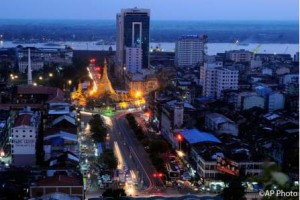16-20 December: A Year of Nascent Reforms Taking Root, Challenges for Future Growth
December 20, 2013 2013 has been a year in which many of the nascent reforms of 2012 have begun to take root, but also one in which new challenges have emerged. In 2014, there will be many opportunities for the government of Burma to show its commitment to democratic transition.
2013 has been a year in which many of the nascent reforms of 2012 have begun to take root, but also one in which new challenges have emerged. In 2014, there will be many opportunities for the government of Burma to show its commitment to democratic transition.
This year saw the historic meeting of ethnic armed groups in Laiza, Kachin State, with a second due in Karen State the third week of January. Despite such important conferences, the uncertainty of the ceasefire process has had an impact on ethnic unity. After several postponements, the government is planning to hold its nationwide ceasefire in early 2014. Such a public show will not be enough to solve decades of armed conflict and ethnic inequality; the government, its Union Peace Working Committee and all ethnic armed groups must engage in a comprehensive, inclusive political dialogue with all parties on an equal footing. An independent third party mediator would help ensure that the difficult underlying issues, such as the power of the Burma Army, political power sharing between the government and ethnic nationalities, resource management, and justice for human rights abuses committed by all sides, are finally addressed and sustainable peace is achieved.
In 2013, the Parliamentary Joint-Committee for Reviewing the Constitution began receiving recommendations on amendments to the 2008 Constitution. Daw Aung San Suu Kyi and the United States have called for the amendment of the section that bars her from running for president. However, there are fundamental problems with the constitution that have deeper implications for the country, such as the entrenched political power of the military, the lack of rights for all people of Burma, inequality and lack of autonomy for ethnic nationalities, and land rights issues. Whether the constitution is ultimately rewritten or amended in 2014, these changes will set the future of the country’s reform process.
In the last year, there has been a surge of foreign companies seeking to invest in Burma’s opening market. Existing laws are not protecting the people from human rights violations associated with investment, most notably the rampant land confiscation occurring throughout the country. These violations are likely to increase in 2014 with pervasive corruption and crony capitalism that are still enshrined in the country and inadequate laws that fail to protect local communities.
President Thein Sein pledged that all political prisoners would be released by the end of 2013. However, according to the Assistance Association for Political Prisoners, there are still 44 behind bars and hundreds facing trials. The next couple of months will show if the revolving door for political prisoners will finally stop. For this to happen, Parliament must repeal Article 18 of the Peaceful Assembly and Peaceful Procession Law, under which many of the new political prisoners are being arrested.
In 2014, the government will undertake its first national census in three decades, which will have implications for the registration of voters ahead of the 2015 elections. It could also further marginalize minorities not recognized by the government, such as the Rohingya who have faced brutal violence and discrimination this year.
As the Chair of ASEAN in 2014, regional attention will focus on Burma and its ongoing transition. This year will be an opportunity for the government to be a leader for the region, advancing the goal of economic integration as well as focusing on establishing unity and peace, both domestically and regionally. We hope that the government will provide civil society with the space, independence and freedom to organize a successful and inclusive ASEAN Civil Society Conference/ASEAN Peoples’ Forum alongside the summit.
With all of the challenges and opportunities 2014 is likely to present, we look forward to continuing to work closely with our partners to ensure that this is a year that will improve the situation on the ground for all the people of Burma, bringing peace, prosperity, security and freedom.
Our Weekly Highlights will take a short hiatus over the holidays but we will return with a full issue on 13 January.
We wish you happy holidays and all the best for 2014.
In Solidarity,
The Burma Partnership Secretariat
News Highlights
Inside Burma
Parliamentary Joint-Committee for Reviewing the Constitution to meet in the new year to “process and discuss” all received proposals regarding amending the 2008 Constitution; 9 parties to form Federal Democratic Alliance to push for a democratic federal union and for amendments to the constitution
A truck explodes due to a suspected bomb blast in northern Shan State killing three; authorities accuse the National Democratic Alliance Army of being responsible
Burma Army leases confiscated land in Ngapali Beach to five construction companies
Regional
International
New report from UN Office on Drugs and Crime states that opium production has risen 26% in Burma
Opinion
A Prelude to Murder: Calling Humans Vermin
By Susan Benesch and Michael Abramowitz
The Wall Street Journal
Transforming the Culture of Human Rights in Myanmar
By David Scott Mathieson
The Myanmar Times
Latest from the Blog
Japan’s Opportunity to Prove Itself a Responsible Investor in Burma
By Burma Partnership
Statements and Press Releases
Letter to President Obama on Political Prisoners
By 42 human rights organizations
Burmese Political Prisoners on Hunger Strike in Jail
By Burma Campaign UK
Dr Cynthia Maung Receives Honorary Doctorate in Medicine from Ubon Ratchathani University, Thailand
By Mae Tao Clinic
Secret Camps Holding Rohingya Refugees Must Be Closed Immediately
By Mekong Migration Network
President Obama: Urge Burma To Stop New Political Arrests
By US Campaign for Burma
Reports
Ethnic Conflict in Burma/Myanmar: From Aspirations to Solutions
By Transnational Institute and Burma Centrum Nederland
This post is in: Weekly Highlights









 All posts
All posts